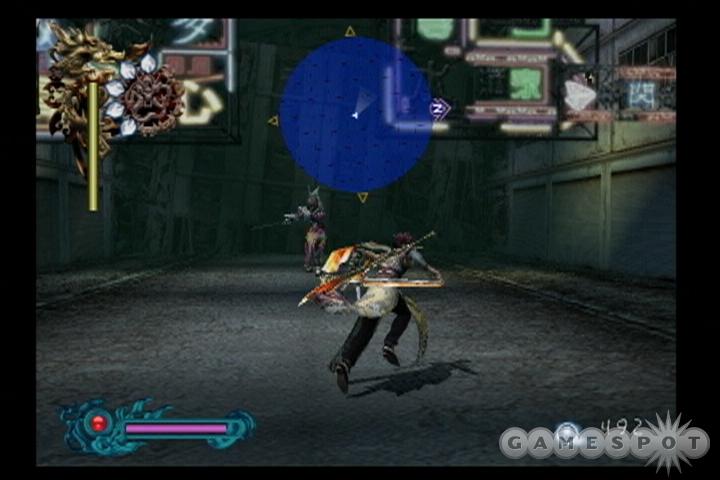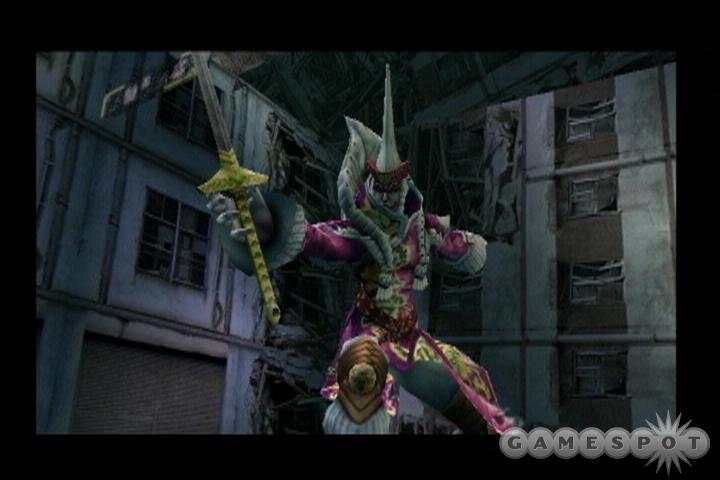Bujingai: The Forsaken City Preview
Superhuman postapocalyptic warriors ain't nothin' to mess with.
In the wake--and the spirit--of last year's high-flying, kung fu-inspired Xbox action game Otogi: Myth of Demons comes Bujingai: The Forsaken City, a new hack-and-slash game with similarly showy intent but perhaps a more grandiose implementation. The game shares some of the same soaring mechanics that made Otogi's brand of action unique, but its flair for flashy, over-the-top sword combat is even more extreme, and it features a pretty darn unique style to boot. We've spent some time with the Japanese version of Bujingai--created by an internal team at Taito in conjunction with Gungrave developer Red Entertainment--and we found that a pretty complex and rewarding combat system underlies the game's colorful, flamboyant presentation.

Bujingai casts you in the role of Lau, a dual sword-wielding warrior fighting through a postapocalyptic future world filled with legions of enemy automatons and superpowerful beings. Though most of Earth's population was destroyed, the survivors inexplicably gained mysterious superhuman abilities, hence Lau's amazing fighting prowess and agile maneuverability. Though it may not be apparent to the average American gamer, anime fans will be interested to know that the characters in the game were designed by Toshihiro Kawamoto, notably of Cowboy Bebop fame, and the design of Lau himself is based heavily on popular gothic Japanese rock star Gackt, who also provided voice-over for the character.
Bujingai imparts its style as much through the extremely colorful, flashy presentation of its action as it does through the actual designs of its characters and environments. The game's basic combat system initially seems very simple--so simple, in fact, that you might mistakenly think it's a button-masher--but as you play, you'll discover there's actually a lot of technique involved. Lau's basic attack starts off with the square button, and indeed you can simply hit this button as fast as possible to pull off a lengthy, preset combo animation that's pretty good at dealing with lesser enemies. However, just because you can kick a decent amount of tail with one button doesn't mean you would want to, and, in fact, a lot of the fun in Bujingai's combat comes from the way you can link different attacks together to produce lengthy combo strings.
In addition to this basic combo attack, you can do a spinning attack with the triangle button that will help you attack enemies on all sides. Furthermore, you can hit triangle at any point during your basic combo to interrupt the combo and branch off with multiple options. Once you've done the combo interrupt, hitting triangle again will let you integrate the spinning slash move into the combo; hitting square will let you uppercut your enemy high into the air so you can continue to juggle him and score additional hits; and hitting the X button will add a flying rapid kick to the end of the combo. You can also work magic spells into your combos with this same method, which you'll accrue throughout the game. Initially, you'll have access to a straightforward fireball attack, though one spell we saw from later in the game involved a ring of knives that circled around Lau and flew off to attack his enemies.

Though the less-skilled enemies you fight will accept your punishment without too much of a fuss, powerful ones (especially bosses) will take some exception to your attempts to gut them with two big swords. So when an enemy blocks your strike, the game will switch into a back-and-forth parrying mode in which the timing of your button presses determines who has the upper hand (which is represented by colored flashes that integrate well into the frenetic flow of the action). If your timing is accurate enough, you'll be able to beat back your opponent and eventually score a hit, but if you're off, be careful--Lau can tolerate only so many misses before he takes a hit himself. The way the camera angle switches back and forth during these one-on-one fights is extremely fast and pretty exciting to watch.
Lau's abilities don't stop with the sword antics, however--he's got some substantial acrobatic moves up his sleeve as well. Wall-running, for example, has become a rather popular trick in games of late (see Prince of Persia or Ninja Gaiden), although most games severely limit the amount of time you can spend going horizontal. Not so Bujingai, however--Lau can effectively run straight up walls forever if he pleases. You can jump to a wall and hold the jump button to run up it, and though your momentum will fade, you can jump again and renew your movement to keep going. You can also glide around mid-jump, Otogi-style, and fight high-jumping enemies in the air. Again, skillful players will be able to maintain this gliding ability indefinitely. Once mastered, these abilities make getting around the game's environments a breeze for an experienced player. Getting from point A to point B isn't a chore, so the focus remains squarely on the combat.
Bujingai is a game very much focused on its core combat mechanics, and the players who latch onto it will be the ones who are really into honing their abilities and seeing their performance tangibly improve as they master a game. For them, Bujingai will offer a lot of tangible rewards. There's an in-game combo counter that will keep track of the number of hits you've strung together--and we were told that a thousand-hit combo is indeed possible. Higher difficulty levels will decrease the game's tolerance for sloppy timing--on the hardest difficulty, you'll have a hell of a time keeping up in a duel with some of the more powerful characters. You'll also be ranked at the end of a level based on all sorts of factors--your swordplay, completion time, number of items picked up, and so on--and assigned an overall score per stage. And like in many recent action games, the better you perform, the more you'll be able to increase the essential aspects of your character, including amount of health and combat abilities.

Since it's already out in Japan, we have a pretty good idea of what the final American version of Bujingai will look like. Lau's character model is finely detailed and richly ornamented--his costume bears all sorts of streamers and such that flap around while he's fighting. The motion capture is quite good, too--the fluidity of your character's movements as you perform some of the wildly exaggerated combat moves is pleasing. And as mentioned, the combat sequences are extremely flashy and fast-paced, making the combat hectic and exciting. Alas, the backgrounds are a little sparsely detailed, though there are a decent number of set pieces that you can hack apart (such as in a bamboo grove where all the bamboo falls to your blades). The frame rate is exceedingly smooth, at least, which facilitates the blindingly fast action.
Bujingai: The Forsaken City is looking like a solid game with a good amount of depth for fans of hardcore action. Many of its elements contribute to its unique style--in addition to the wild action and flashy visuals, the music is an interesting mix of glam rock wailing guitars and traditional Asian themes, and the voice acting is of the overly melodramatic type you'll hear in a lot of subtitled anime. The gameplay that underpins all this craziness seems to be pretty rich, too, which never hurts. Bam is targeting a May date for Bujingai, and we'll bring you more information on the localized version of the game as its release approaches.
Got a news tip or want to contact us directly? Email news@gamespot.com
Join the conversation